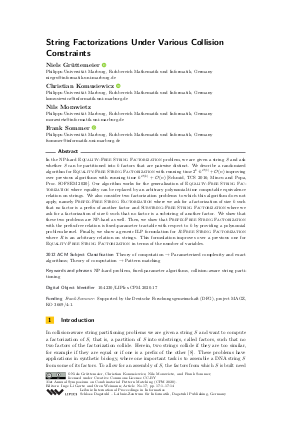String Factorizations Under Various Collision Constraints
Authors
Niels Grüttemeier  ,
Christian Komusiewicz
,
Christian Komusiewicz  ,
Nils Morawietz,
Frank Sommer
,
Nils Morawietz,
Frank Sommer 
-
Part of:
Volume:
31st Annual Symposium on Combinatorial Pattern Matching (CPM 2020)
Part of: Series: Leibniz International Proceedings in Informatics (LIPIcs)
Part of: Conference: Annual Symposium on Combinatorial Pattern Matching (CPM) - License:
 Creative Commons Attribution 3.0 Unported license
Creative Commons Attribution 3.0 Unported license
- Publication Date: 2020-06-09
File

PDF
LIPIcs.CPM.2020.17.pdf
- Filesize: 0.53 MB
- 14 pages
Document Identifiers
Subject Classification
ACM Subject Classification
- Theory of computation → Parameterized complexity and exact algorithms
- Theory of computation → Pattern matching
Keywords
- NP-hard problem
- fixed-parameter algorithms
- collision-aware string partitioning
Metrics
- Access Statistics
-
Total Accesses (updated on a weekly basis)
0PDF Downloads0Metadata Views
Abstract
In the NP-hard Equality-Free String Factorization problem, we are given a string S and ask whether S can be partitioned into k factors that are pairwise distinct. We describe a randomized algorithm for Equality-Free String Factorization with running time 2^k⋅ k^{𝒪(1)}+𝒪(n) improving over previous algorithms with running time k^{𝒪(k)}+𝒪(n) [Schmid, TCS 2016; Mincu and Popa, Proc. SOFSEM 2020]. Our algorithm works for the generalization of Equality-Free String Factorization where equality can be replaced by an arbitrary polynomial-time computable equivalence relation on strings. We also consider two factorization problems to which this algorithm does not apply, namely Prefix-Free String Factorization where we ask for a factorization of size k such that no factor is a prefix of another factor and Substring-Free String Factorization where we ask for a factorization of size k such that no factor is a substring of another factor. We show that these two problems are NP-hard as well. Then, we show that Prefix-Free String Factorization with the prefix-free relation is fixed-parameter tractable with respect to k by providing a polynomial problem kernel. Finally, we show a generic ILP formulation for R-Free String Factorization where R is an arbitrary relation on strings. This formulation improves over a previous one for Equality-Free String Factorization in terms of the number of variables.
Cite As Get BibTex
Niels Grüttemeier, Christian Komusiewicz, Nils Morawietz, and Frank Sommer. String Factorizations Under Various Collision Constraints. In 31st Annual Symposium on Combinatorial Pattern Matching (CPM 2020). Leibniz International Proceedings in Informatics (LIPIcs), Volume 161, pp. 17:1-17:14, Schloss Dagstuhl – Leibniz-Zentrum für Informatik (2020)
https://doi.org/10.4230/LIPIcs.CPM.2020.17
BibTex
@InProceedings{gruttemeier_et_al:LIPIcs.CPM.2020.17,
author = {Gr\"{u}ttemeier, Niels and Komusiewicz, Christian and Morawietz, Nils and Sommer, Frank},
title = {{String Factorizations Under Various Collision Constraints}},
booktitle = {31st Annual Symposium on Combinatorial Pattern Matching (CPM 2020)},
pages = {17:1--17:14},
series = {Leibniz International Proceedings in Informatics (LIPIcs)},
ISBN = {978-3-95977-149-8},
ISSN = {1868-8969},
year = {2020},
volume = {161},
editor = {G{\o}rtz, Inge Li and Weimann, Oren},
publisher = {Schloss Dagstuhl -- Leibniz-Zentrum f{\"u}r Informatik},
address = {Dagstuhl, Germany},
URL = {https://drops.dagstuhl.de/entities/document/10.4230/LIPIcs.CPM.2020.17},
URN = {urn:nbn:de:0030-drops-121428},
doi = {10.4230/LIPIcs.CPM.2020.17},
annote = {Keywords: NP-hard problem, fixed-parameter algorithms, collision-aware string partitioning}
}
Author Details
Funding
- Sommer, Frank: Supported by the Deutsche Forschungsgemeinschaft (DFG), project MAGZ, KO 3669/4-1.
References
-
Hideo Bannai, Travis Gagie, Shunsuke Inenaga, Juha Kärkkäinen, Dominik Kempa, Marcin Piatkowski, and Shiho Sugimoto. Diverse palindromic factorization is NP-complete. Int. J. Found. Comput. Sci., 29(2):143-164, 2018.

-
Andreas Björklund. Determinant sums for undirected hamiltonicity. SIAM J. Comput., 43(1):280-299, 2014.

-
Andreas Björklund, Thore Husfeldt, Petteri Kaski, and Mikko Koivisto. Narrow sieves for parameterized paths and packings. J. Comput. Syst. Sci., 87:119-139, 2017.

-
Andreas Björklund, Petteri Kaski, and Lukasz Kowalik. Fast witness extraction using a decision oracle. In Proceedings of the 22nd Annual European Symposium on Algorithms (ESA '14), volume 8737 of LNCS, pages 149-160. Springer, 2014.

-
Laurent Bulteau, Falk Hüffner, Christian Komusiewicz, and Rolf Niedermeier. Multivariate algorithmics for NP-hard string problems. Bulletin of the EATCS, 114, 2014.

-
Peter Burcsi, Ferdinando Cicalese, Gabriele Fici, and Zsuzsanna Lipták. Algorithms for jumbled pattern matching in strings. Int. J. Found. Comput. Sci., 23(2):357-374, 2012.

-
Anne Condon, Ján Manuch, and Chris Thachuk. Complexity of a collision-aware string partition problem and its relation to oligo design for gene synthesis. In Proceedings of the 14th International Computing and Combinatorics Conference (COCOON '08), volume 5092 of LNCS, pages 265-275. Springer, 2008.

-
Anne Condon, Ján Manuch, and Chris Thachuk. The complexity of string partitioning. J. Discrete Algorithms, 32:24-43, 2015.

-
Maxime Crochemore and Wojciech Rytter. Jewels of stringology. World Scientific, 2002.

-
Marek Cygan, Fedor V. Fomin, Lukasz Kowalik, Daniel Lokshtanov, Dániel Marx, Marcin Pilipczuk, Michal Pilipczuk, and Saket Saurabh. Parameterized Algorithms. Springer, 2015.

-
Henning Fernau, Florin Manea, Robert Mercas, and Markus L. Schmid. Pattern matching with variables: Fast algorithms and new hardness results. In Proceedings of the 32nd International Symposium on Theoretical Aspects of Computer Science (STACS '15), volume 30 of LIPIcs, pages 302-315. Schloss Dagstuhl - Leibniz-Zentrum fuer Informatik, 2015.

-
Klaus Jansen, Felix Land, and Kati Land. Bounding the running time of algorithms for scheduling and packing problems. SIAM J. Discrete Math., 30(1):343-366, 2016.

-
Christian Komusiewicz, Mateus de Oliveira Oliveira, and Meirav Zehavi. Revisiting the parameterized complexity of maximum-duo preservation string mapping. In Proceedings of the 28th Annual Symposium on Combinatorial Pattern Matching (CPM '17), volume 78 of LIPIcs, pages 11:1-11:17. Schloss Dagstuhl - Leibniz-Zentrum fuer Informatik, 2017.

-
Lukasz Kowalik and Juho Lauri. On finding rainbow and colorful paths. Theor. Comput. Sci., 628:110-114, 2016.

-
Radu Stefan Mincu and Alexandru Popa. The maximum equality-free string factorization problem: Gaps vs. no gaps. In Proceedings of the 45th International Conference on Current Trends in Theory and Practice of Computer Science (SOFSEM '20), volume 12011 of LNCS, pages 531-543. Springer, 2020.

-
Markus L. Schmid. Computing equality-free and repetitive string factorisations. Theor. Comput. Sci., 618:42-51, 2016.

